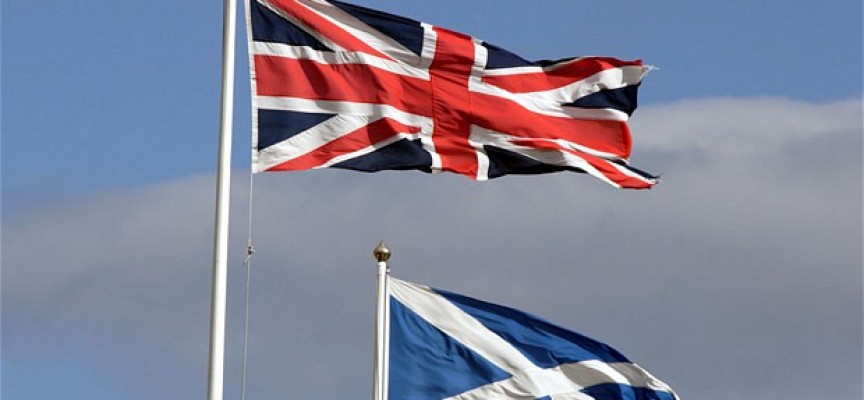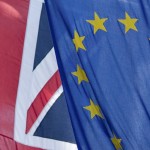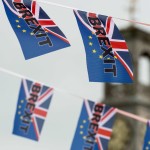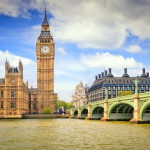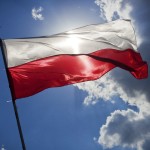Here’s a trick question for you: when does a vote to leave a European union become a vote for the European Union?
Sounds a bit like the start to a bad joke?
But it’s not a joke, it’s the state of political affairs within the United Kingdom.
Scotland is heading to the voting booths on September 18 to decide, by referendum, on whether or not it should end the 307-years union with England. With the pro-independence pro-EU Scottish National Party (SNP) holding the reigns of power in Scotland’s devolved government, and with the anti-EU United Kingdom Independence Party upsetting the political establishment by becoming the largest party in England during the 2014 European election results, it really does look like a pro-Scottish independence vote could also be a pro-European Union vote.
After all, there is an irony right at the heart of the independence referendum debate and, in the event of a ‘Yes’ vote, it relates to Scotland’s relationship with the EU.
It has not been unfamiliar for those arguing against Scotland’s independence to also push the idea that if there is a ‘Yes’ vote to independence then Scotland becomes a new state and, therefore, will have to apply to join the EU as a new entity.
The basic argument is that Scotland and England ceased to exist as political entities back in 1707 when they merged parliaments. Thus, the logic to this argument is that it was the UK, not the component parts of the UK, which signed up in 1973 to the European Economic Community, the predecessor to the EU.
The alternative view is that Scotland and England continued to exist within the confines of the 1707 union, something equivalent to an early form of European Union. Therefore, the logic to this argument is that Scotland is already part of the EU. But, it is fair to suggest, this latter argument is losing.
However, the difference between Scotland “applying” or “re-applying” for EU membership maybe both subtle and politically profound, but the result looks as if it will be the same – Scotland will likely not be an immediate member of the EU following a vote for independence.
But history books are packed with unforeseen quirks and circumstances. As the former UK Prime Minister, Harold MacMillan, reportedly said: “Events, dear boy, events”.
And the 2014 EU elections have been one hell of an event. The warnings that an independent Scotland will feel the chill as it sits on the outside-looking-in at the warmth of an EU of sovereign states was blown out if its Scottish oil-filled waters.
This political and economic Armageddon threat had some form of currency pre EU elections. But with the electoral success of the anti-EU UKIP, a party who’s central policy is to withdraw from the EU, it now seems ironic that Scotland could vote to remain within a UK which then votes to leave the EU!
What the European Elections have suggested is that Scotland’s political-spectrum-centre-of-gravity is dramatically different from the anti-EU vortex which England seems to be increasingly sucked towards..
However it was suggested by some commentators that the fact that UKIP won one of Scotland’s six seats, and over 10 per cent of the vote, seems to indicate that there is no great political difference between north and south of the border, thus calling into question Scotland’s distinctiveness.
But this logic seems to be problematic. With more than 27 per cent of England’s electorate voting for UKIP, producing 22 seats, it seems England has more in common with France than it is does with Scotland. Like England, the largest political party in the French EU elections was a strongly anti-EU party – in that case the right-wing Front National, which received over 25 per cent of the vote.
The only obvious similarity Scotland’s vote has with both France and England, following the EU election, is that Scotland’s largest party is also a nationalist party, and one which also received over one quarter of the votes, coming in at 28.9 per cent. However, that is where the similarities end, as, unlike NF and UKIP, the SNP is a pro-EU left-of-centre party.
It, of course, would be a politically naive and undemocratic-mindset for anyone to assume that Scotland would not be affected by the prevailing political winds which have swept right across the EU, resulting in a shift towards anti-EU right-of-centre parties, such as Greece’s Golden Dawn Party, Denmark’s Danish People’s Party or Austria’s Freedom Party.
With UKIP’s increase in votes and seats comes an increase in how seriously they and their policies are taken by the major London-based political parties, the official opposition Labour Party and the UK Government coalition partners of the Conservatives and the Liberal Democrats.
What an irony it will be if, come September 18, 2014, the majority of Scotland’s electorate votes to end a European union so that they can ensure a future with The European Union.
Ecco una strana domanda: quand’è che un voto per abbandonare un’unione europea diventa un voto per l’Unione Europea?
Sembra quasi l’inizio di una brutta barzelletta? Ma non è una barzelletta, è lo stato delle questioni politiche nel Regno Unito.
La Scozia si sta muovendo verso le urne per decidere con un referendum, il 18 settembre, se concludere o meno l’unione con l’Inghilterra durata 307 anni. Con il Partito nazionale scozzese, pro-indipendenza, pro-Ue, al momento alla guida del governo della Scozia e con il Partito per l’indipendenza del Regno Unito (Ukip), anti-Ue, che sconvolge l’establishment politico diventando il più grande partito in Inghilterra nei risultati delle elezioni europee del 2014, sembra davvero che un voto per l’indipendenza scozzese potrebbe anche essere un voto pro-Unione europea.
Dopo tutto, c’è dell’ironia proprio al centro del dibattito referendario per l’indipendenza che, nel caso di un voto favorevole, andrebbe a incidere sul rapporto tra Scozia e Ue.
Chi si oppone all’indipendenza della Scozia è solito anche paventare l’ipotesi che, se ci sarà un ‘Sì’ delle urne per l’indipendenza, la Scozia diventerà un nuovo Stato e, quindi, dovrà chiedere di aderire all’Ue come una nuova entità.
L’argomentazione di fondo è che la Scozia e l’Inghilterra cessarono di esistere come entità politiche nel 1707, quando si unirono i due parlamenti. Pertanto, la logica di questo ragionamento è che il Regno Unito, non i componenti del Regno Unito, è entrato nel 1973 nella Comunità economica europea, antenata dell’Ue.
Un’argomentazione alternativa è che Scozia e Inghilterra hanno continuato a esistere entro i confini dell’unione del 1707, qualcosa equivalente a una forma primordiale di Unione europea. La logica di questo ragionamento è che la Scozia è già parte dell’Ue. È giusto però segnalare che questa seconda argomentazione è debole.
Tuttavia, la differenza tra la Scozia che “si candida” o “si ri-candida” per l’adesione all’Ue forse è allo stesso tempo sottile e politicamente profonda, ma sembra che la conclusione sarà la medesima: la Scozia probabilmente non sarà nell’immediato membro dell’Ue in conseguenza di un voto per l’indipendenza.
I libri di storia però sono pieni di stranezze e circostanze impreviste. L’ex primo ministro britannico, Harold MacMillan, si dice abbia detto: “Gli eventi, caro ragazzo, gli eventi”. E le elezioni europee 2014 sono state un evento incredibile. L’ avvertimento che una Scozia indipendente sentirà il freddo stando seduta fuori guardando al calore di un’Unione europea di Stati sovrani è emerso dalle acque scozzesi piene di petrolio.
Questa minaccia politica ed economica tipo- Armageddon ha avuto una qualche risonanza nella fase pre-elezioni europee. Ma con il successo elettorale del movimento Ukip anti-Ue, un partito il cui nodo politico centrale è l’uscita dall’Unione, ora sembra ironico che la Scozia possa votare di rimanere in un Regno Unito che poi vota di lasciare l’Ue!
Ciò che le elezioni europee hanno suggerito è che lo spettro politico che costituisce il centro di gravità della Scozia è radicalmente diverso dal vortice anti-Ue verso cui l’Inghilterra sembra essere sempre più risucchiata.
Tuttavia è stato suggerito da alcuni commentatori che il fatto che l’Ukip abbia vinto una delle sei poltrone della Scozia, e oltre il 10 per cento dei voti, sembra indicare che non c’è grande differenza politica tra il Nord e il Sud del Paese, ponendo così in discussione Il carattere distintivo della Scozia.
Ma questa logica sembra essere problematica. Con oltre il 27% dell’elettorato inglese a favore dell’Ukip, decidendo 22 seggi, sembra che l’Inghilterra abbia più cose in comune con la Francia di quante ne abbia con la Scozia. Come in Inghilterra, il più grande partito politico nelle elezioni europee francesi è stato un partito fortemente anti-Ue, in questo caso la destra del Front National, che ha ottenuto oltre il 25% dei voti.
L’unica evidente somiglianza che il voto della Scozia ha sia con la Francia sia con l’Inghilterra, dopo le elezioni europee, è che il più grande partito della Scozia è anche un partito nazionalista, e che ha anche ricevuto più di un quarto dei voti, attestandosi a 28,9%. Tuttavia qui è dove le somiglianze finiscono, in quanto, a differenza di Front National e Ukip, il Snp (Scottish National Party) è un partito di sinistra, pro-Ue.
E, naturalmente, sarebbe un pensiero politicamente ingenuo e non-democratico da parte di chiunque credere che la Scozia non sarebbe stata influenzata dai venti politici prevalenti che hanno spazzato l’Ue, con un conseguente spostamento verso partiti anti-Ue di centro-destra, come la Grecia del Golden Dawn Party, il Partito del popolo danese in Danimarca o il Partito della libertà austriaco.
Con l’aumento di voti e seggi dell’Ukip cresce anche la misura in cui essi e le loro politiche sono considerati dai principali partiti politici con sede a Londra, il partito laburista, l’opposizione ufficiale, e i conservatori e liberal-democratici, partner della coalizione di governo del Regno Unito.
Che ironia sarà se, arrivato il 18 settembre 2014, la maggioranza dell’elettorato della Scozia voterà per concludere un’unione europea in modo da potersi garantire un futuro con l’Unione europea.
Simon Dames
Latest posts by Simon Dames (see all)
- The unthinkable may happen - 15 settembre 2014
- Scotland between UK and EU - 4 giugno 2014

